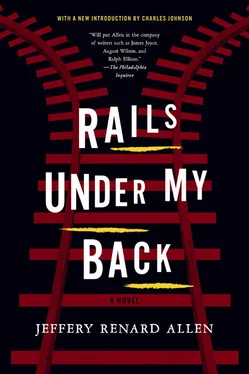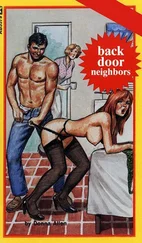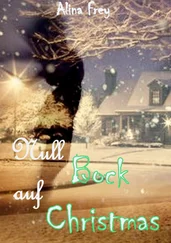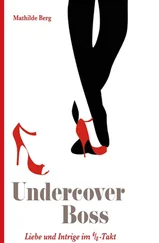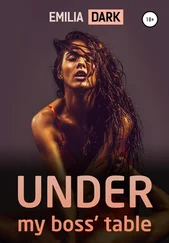I started out working in the roundhouse. That’s where all the trains come in. I polished parts and kept the engines shining. Then they promoted me to switchman. My job was to open and close the track. I made forty cents an hour in 1941. In September I got a raise to fifty cents. In December I got promoted to seventy cents. Not bad money in those days.
Not at all.
Would you take my bag down? The preacher pointed to the luggage rack above their heads.
Sure.
The preacher adjusted his legs to allow Lucifer to stand. Lucifer slid the suitcase — old and heavy; It’ll last forever —from the overhead rack, balancing his body against the moving train — the train was spinning through Pennsylvania; Lucifer could see the drift of it all, the black face of a ridge, then stretched land below tree-covered mountains — and gently placed it on the preacher’s lap.
Thanks.
No problem. Lucifer retook his seat.
The preacher snapped the latches and disappeared inside the open suitcase. Placed two wedges of tinfoil on the suitcase — a makeshift table — and began to unwrap them. Have some. A pork chop sandwich blazed from the preacher’s outstretched palm.
No, thank you.
Are you sure?
I already ate.
The best time of my life was when I was struggling. The preacher took an anxious bite from his pork chop sandwich. God has been good to me.
Not God again. Lucifer wanted to tell the preacher to shut up about God. He mouthed a silent prayer for God to shut the preacher’s mouth.
He gave me five children. The preacher chewed white words. And almost a sixth. The preacher started on a second wedge of sandwich. My wife could make one chicken go far. And as we sat at the table, each child would tell a story. The preacher disappeared behind his open suitcase. Reappeared with a triangle of tinfoil. His careful fingers opened it. Revealed a piece of sweet potato pie with raisins. Have some.
No, thanks.
I taught my kids the importance of instruction. The preacher ate the pie with three bites. I always told them, Do your best. The preacher brought a handkerchief white to his face. Cleaned his mouth and hands. Picked orange string from his teeth. Sucked his fed teeth. You have kids?
The preacher’s question ran through Lucifer’s life like an accusing voice. Yes, Lucifer said. Two. A son and a daughter.
We were poor but my wife always kept the children clean. There’s no excuse for not keeping yourself clean.
The preacher’s voice strapped Lucifer in tightening circles of anger. Would you like something to drink? I could go to the dining car and—
No, thanks. I got something right here. For the third time, the preacher leaned into his open suitcase. Leaned back into his seat with a mason jar full of tea dark as the old leather suitcase. Buoyant cubes chimed against the glass. The preacher unscrewed the lid. And when we could, my wife made each child their favorite dish. The preacher tilted his head back. Drank slow and deep, his long throat working the liquid. He screwed the lid back on the jar. Things were bad. The preacher folded the tinfoil into neat squares. We had five kids to clothe and feed. Returned the squares and the mason jar to his suitcase. We had two girls in college. And the bill collectors threatened to throw me in jail. The water was up to here — the preacher held the edge of his hand before his nose — but God didn’t let me drown.
OUTSIDE THE WINDOW, the slums of West Philly, rows of two-flat brick houses — two symmetrical windows on each floor, a small porch, wooden rails — twins of the flat brick houses in South Lincoln. Light made the houses transparent. Lucifer could see women with perfect breasts, men with penises naturally contoured, whiskey brawlings, bare vineyards, branching trees of crystal, tall limbs bending overhead, triangular groves, white grass, fat speckled fish, and violets he could not reach. The train shook the window up and down; images swam, paperweight objects gravity-free. And just as suddenly, green forestry, the Philly river, through the window opposite the aisle downtown Philly, its colonial spires, its arcades like a giant’s stiff legs, arching cupolas and rooftops, and highways of blackened stone. The sun faded in a tunnel. The train shoved out the other side and pulled into a city of iron lace. A bridge curved black in blue air, both ends invisible. (Bridge cables?) Thirtieth Street station. The train pulled to a stop. Whistling trains punctuated the distance (silence). Some passengers exited. Others hurried on.
This must be a switching point, the reverend said.
I see.
We should be moving shortly.
Good.
The train started to move, in reverse direction.
Hey, Lucifer said. We’re going in the wrong direction.
Relax, the reverend said. It always does that.
I’M GHOST.
I know. Ain’t seen or heard.
I been busy.
Ain’t we all?
So you found me.
Didn’t think you’d come. Didn’t homeboy — T-Bone aimed his bald head at Abu — smother word?
Yeah, Hatch said. Damn. It’s seven-thirty now. How soon’d you want to get here?
T-Bone looked straight into Hatch’s eyes, an iron path. His bald head gleamed like a chess pawn. He bit down on his toothpick. Held his barking bulldog tattoos in check with the leashes of his shirtsleeves.
Fast as I could get here.
T-Bone continued to iron-watch Hatch. He bit ridges into his toothpick. Tasted it. Savored it. Cool, he said. Held out his hand, a long black line between his thumb and forefinger. Hatch gripped the black scar with everything he had.
Good to see you, T-Bone said. T-Bone squeezed fire into Hatch’s hand.
Same, Hatch said, pain beneath the word.
Abu. T-Bone extinguished the fire. Gripped Abu’s palm. Squeezed Abu’s fat thin for a moment.
What’s up, T-Bone?
Kickin it.
How’s life treatin you?
The same. See a lot. Hear a lot.
Damn, Hatch said. Is that a motor?
T-Bone studied Hatch’s face, eyes unmoving. Stretched straight before him in a gleaming wheelchair. Silver spokes, silver hubs, and the wheels themselves, coated with black rubber. The motor tucked under the seat, small and black, neat as a gift, strong as a lunchbox.
That is a motor, Hatch said. Automatic. A first for T-Bone. Years of manual motion had molded muscle, and you would see him, see his bulldog arms dogsledding him all over the city.
So what. I don’t really need it. I want it. Earned it.
Uh oh, you slippin.
Yeah, Abu said. You slippin.
Nawl. Earned it. Deserve it. A nigga gotta move up, that’s all. I’m still me. You never grow out of being yourself. T-Bone thumped his leather chest.
The boom rocked Hatch, powerful waves. He steadied himself. So you found me. So I’m here. So what’s up?
Same ole same.
Got to be more than that, Hatch said.
Yeah, Abu said. Tell us. I’m all ears.
T-Bone ran his eyes slowly over Hatch’s face. That bitch still troublin you?
Hatch nodded.
What’s her name again?
Elsa.
Spanish, right?
Puerto Rican.
Let me educate you. Cause you know I used to be out there. Race don’t matter. If a bitch won’t give—
That’s why you brought me here? That’s why you want me? You kickin word? You jus want to bust the hype? I thought it was something serious? Abu said you said that it was serious.
Yeah, Abu said. That’s what you said.
T-Bone shot a glance at Abu, then returned his demanding eyes to Hatch’s face.
Hatch caught his drift. Abu, Hatch said, I check you later.
What?
Why don’t you go get the tickets. I’ll meet you there in a few. Better yet, I’ll pick them up. Meet you back at the house later.
Читать дальше
